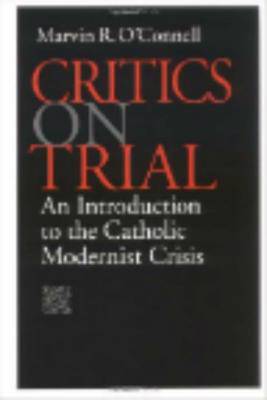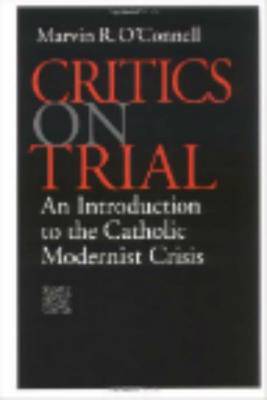
- Afhalen na 1 uur in een winkel met voorraad
- Gratis thuislevering in België vanaf € 30
- Ruim aanbod met 7 miljoen producten
- Afhalen na 1 uur in een winkel met voorraad
- Gratis thuislevering in België vanaf € 30
- Ruim aanbod met 7 miljoen producten
Critics on Trial
An Introduction to the Catholic Modernist Crisis
Marvin R O'ConnellOmschrijving
Here for the first time, the story of the Catholic Modernists is presented as a chronological narrative of events, with special emphasis placed upon the persons involved, their interrelations and opinions. Through a study of the participants, Marvin O'Connell traces the emergence of Modernism and the controversies related to it, offers a careful examination of the movement's multiple causes and ramifications, and places the events within the political, social, and intellectual context of the time. Rather than analyze the phenomenon called Catholic Modernism or argue one side or the other, the author tells the story of the Modernists themselves. These intellectuals-scripture scholars, philosophers, apologists, priests, and laypersons-were bound together by a mutual concern that the church could not survive the challenges of the modern world unless it brought its teaching and its constitution into line with contemporary thought. They offered unconventional solutions to the religious questions of the day, solutions they were convinced would reform and revivify their church. Their story involves a cast of fascinating characters: the deeply learned and deeply skeptical exegete, Alfred Loisy; the lyrical and melancholy Anglo-Irish Jesuit, George Tyrell; the eccentric polymath, Friedrich von Hegel; the apostle of Christian democracy, Romolo Murri; the combative philosopher, Lucien Laberthonniere, and his mentor, Maurice Blondel. Against them stood the pope who, in the name of doctrinal integrity, sought to root out and destroy their ideas. O'Connell follows the drama step by step until it reaches its climax in the condemnations of 1907, when Pius X denounced Catholic Modernism as the synthesis of all heresies. The author recounts the story largely in the words of the Modernists and their opponents, as well as those who, like the journalist and biographer Wilfrid Ward and the scripture scholar Marie-Joseph Lagrange, desperately sought a middle ground. Critics on Trial offers the nonspecialist a reliable, compelling account of the Modernist crisis; it offers the student of nineteenth- and twentieth-century religious and intellectual history a thorough introduction to the topic.
Specificaties
Betrokkenen
- Auteur(s):
- Uitgeverij:
Inhoud
- Aantal bladzijden:
- 410
- Taal:
- Engels
Eigenschappen
- Productcode (EAN):
- 9780813208008
- Verschijningsdatum:
- 1/12/1994
- Uitvoering:
- Paperback
- Formaat:
- Trade paperback (VS)
- Afmetingen:
- 155 mm x 229 mm
- Gewicht:
- 671 g

Alleen bij Standaard Boekhandel
Beoordelingen
We publiceren alleen reviews die voldoen aan de voorwaarden voor reviews. Bekijk onze voorwaarden voor reviews.











